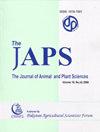Evaluation des toxicités aigue et subaiguë de l’extrait aqueux des feuilles de Tetracera potatoria Ex. G. Don chez les rongeurs de laboratoire
IF 0.5
4区 生物学
Q3 AGRICULTURE, MULTIDISCIPLINARY
引用次数: 0
Abstract
1 RESUME Tetracera potatoria est une plante médicinale utilisée traditionnellement en Afrique contre quelques maladies infectieuses. La consommation exagérée des produits de cette plante, tout comme pour ceux des autres plantes, peut présenter des risques d’intoxication pour les consommateurs. Le but de ce travail a donc été d’explorer les activités toxicologiques aiguë et subaiguë de l’extrait aqueux de cette plante chez les souris et les rats en vue de garantir la sécurité des consommateurs de cette plante. L’extrait aqueux des feuilles de T. potatoria récoltées dans le département de la Bouenza a été administré aux souris et rats tests et de l’eau distillée aux témoins. Les effets de cet extrait sur le comportement, l’état général, la mortalité des souris ont été observés et les paramètres biochimiques et hématologiques analysés selon les méthodes classiques. Concernant la toxicité aiguë, l’administration d’une dose unique de 5 000 mg/Kg aux souris n’a pas eu d’effets significatifs sur le comportement, la prise de poids et la prise alimentaire ainsi que sur les paramètres biochimiques et hématologiques. Concernant la toxicité subaiguë, par contre, l’administration quotidienne d’une dose de 2000 mg/kg pendant 28 jours aux rats a entrainé des modifications du poids corporel et de certains paramètres biochimiques et hématopoïétiques. Au terme de ce travail, il ressort que l’administration unique de la dose de 5000 mg/kg ne provoque pas des signes de toxicité chez la souris. En traitement subaiguë, cet extrait à 2000 mg/kg provoque une modification significative de quelques paramètres biochimiques et hématologiques chez le rat, sans avoir d’effets significatifs sur les organes nobles. SUMMARY Tetracera potatoria is a medicinal plant used traditionally in Africa against some infectious diseases. The excessive consumption of the products of this plant, as for those of other plants, can present risks of intoxication for the consumers. The aim of this work was therefore to explore the acute and subacute toxicological activities of the aqueous extract of mice and rats in order to guarantee the safety of users of this plant. An aqueous extract of the leaves of T. potatoria, harvested in the department of Bouenza, was administered to the test mice and rats 7980 Mikolo et al., 2020 Journal of Animal & Plant Sciences (J.Anim.Plant Sci. ISSN 2071-7024) Vol.45 (3): 7980-7991 https://doi.org/10.35759/JAnmPlSci.v45-3.3 and distilled water to the controls. The effects of this extract have been analyzed. Regarding acute toxicity, the administration of a single dose of 5000 mg/Kg to mice had no significant effects on behaviour, weight gain and food intake as well as on biochemical parameters and hematopoietic. Regarding sub-acute toxicity, on the other hand, the daily administration of a dose of 2000 mg/kg for 28 days to rats resulted in changes in body weight and certain biochemical and hematopoietic parameters. This work indicates that the single administration of the 5000 mg/kg dose does not cause signs toxicity in mice. In sub-acute treatment, this extract at 2000 mg/kg causes a significant modification of some biochemical and hematological parameters in rats, without having significant effects on noble organs.四叶水提取物对实验室啮齿动物的急性和亚急性毒性评价
四叶草是一种药用植物,传统上在非洲用于治疗一些传染病。过度食用这种植物的产品,以及其他植物的产品,可能会给消费者带来中毒的风险。因此,本研究的目的是探讨该植物水提取物在小鼠和大鼠中的急性和亚急性毒理学活性,以确保该植物消费者的安全。在布恩扎省采集的马铃薯叶水提取物被给予小鼠和大鼠,蒸馏水被给予对照组。观察该提取物对小鼠行为、一般状态和死亡率的影响,并采用常规方法分析生化和血液学参数。在急性毒性方面,单次给小鼠5000 mg/Kg剂量对行为、体重增加、饮食摄入量、生化和血液学参数无显著影响。然而,在亚急性毒性方面,每天给大鼠2000 mg/kg剂量,持续28天,导致体重和某些生化和造血参数的变化。结果表明,单次给药5000 mg/kg不会在小鼠中引起毒性迹象。在亚急性治疗中,2000 mg/kg的提取物对大鼠的一些生化和血液学参数有显著变化,但对器官没有显著影响。= =地理= =根据美国人口普查,这个县的总面积是,其中土地和(1.641平方公里)水。= =地理= =根据美国人口普查,这个县的面积为,其中土地面积为,其中土地面积为。因此,这项工作的目的是探讨老鼠和老鼠的水提取物的急性和亚急性毒理学活动,以确保这种植物使用者的安全。在Bouenza部门收获的T. potatoria叶子的水提取物被用于测试老鼠和大鼠7980 Mikolo等人,2020年动物和植物科学杂志(J.Anim。Sci Plant)。= =地理= =根据美国人口普查,这个县的面积为。= =地理= =根据美国人口普查,这个县的面积为。就急性毒性而言,单次给鼠5000毫克/公斤剂量对行为、增重和食物摄入量以及生化和造血参数均无显著影响。另一方面,关于亚急性毒性,每天给大鼠服用2000毫克/公斤剂量28天会导致体重和某些生化和造血参数发生变化。这项工作表明,单次给药5000毫克/公斤剂量不会引起老鼠毒性的迹象。在亚急性治疗中,2000 mg/kg的这种提取物会引起大鼠某些生化和血液学参数的显著变化,但对器官没有显著影响。
本文章由计算机程序翻译,如有差异,请以英文原文为准。
求助全文
约1分钟内获得全文
求助全文
来源期刊

Journal of Animal and Plant Sciences
Multiple-
CiteScore
1.50
自引率
0.00%
发文量
128
审稿时长
6 months
期刊介绍:
The Journal of Animal and Plant Sciences (JAPS) is a bi-monthly publication and is being published regularly since 1991 by the Pakistan Agricultural Scientists Forum (PAS FORUM). It publishes original research papers, review, extension/clinical articles on all aspects of animal (including fisheries/wildlife) and plant sciences, agricultural economics, rural sociology and other related subjects. The journal is read, abstracted and indexed by the abstracting/indexing agencies of international repute.
 求助内容:
求助内容: 应助结果提醒方式:
应助结果提醒方式:


